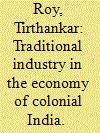| Srl | Item |
| 1 |
ID:
047930


|
|
|
|
|
| Publication |
New Delhi, Sage Publications, 1996.
|
| Description |
338p.
|
| Standard Number |
817036535X
|
|
|
|
|
|
|
|
|
|
|
|
Copies: C:1/I:0,R:0,Q:0
Circulation
| Accession# | Call# | Current Location | Status | Policy | Location |
| 043940 | 338.4767700954/ROY 043940 | Main | On Shelf | General | |
|
|
|
|
| 2 |
ID:
121978


|
|
|
|
|
| Publication |
2013.
|
| Summary/Abstract |
This paper discusses the rise of the East India Company in the contested political world of eighteenth century India, with reference to the manner in which economic power was deployed to enhance military power. It is shown that there was only one successful model of military-fiscal strategy during this time, and that the Company's success was due to interactions between three factors-taxable resources, the strategies of its rivals, and institutional choices.
|
|
|
|
|
|
|
|
|
|
|
|
|
|
|
|
| 3 |
ID:
084840


|
|
|
|
|
| Publication |
2008.
|
| Summary/Abstract |
A figure in part a foreman, in part a headman, and in part a recruiting contractor, formed an indispensable part of labour organization in mills, mines, ports and plantations in nineteenth-century India, and in the tropical colonies where Indian emigrants went for work. Historians have explained the presence of such a figure by the needs of capital for intermediaries, or needs of labour for familiar relationships in an unfamiliar environment. The significance of the labour agent for economic history, however, seems to go beyond these needs. The universal presence of a worker who embodied a variable blend of roles prompts several larger questions. Was the labour agent an institutional response to an economic problem? Were modern forms of agency rooted in older modes of labour organization? The scholarship discussed the gains for employers. Were there costs too? This paper is a preliminary attempt at framing these larger issues. I suggest here that the agent had roots in the traditional economy, and represented an incorporation of putting out and the authority of the headman inside modern work sites, and that this incorporation of traditional authority in a modern setting gave rise to contradictions.
|
|
|
|
|
|
|
|
|
|
|
|
|
|
|
|
| 4 |
ID:
049952


|
|
|
|
|
| Publication |
Cambridge, Cambridge University Press, 1999.
|
| Description |
xi, 252p.
|
| Series |
Cambridge Studies in Indian History and Society: 5
|
| Standard Number |
0521650127
|
|
|
|
|
|
|
|
|
|
|
|
Copies: C:1/I:0,R:0,Q:0
Circulation
| Accession# | Call# | Current Location | Status | Policy | Location |
| 042211 | 338.0954/ROY 042211 | Main | On Shelf | General | |
|
|
|
|